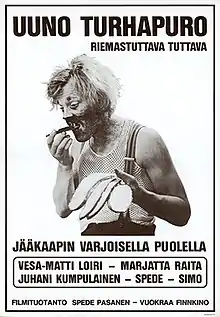Uuno Turhapuro (film)
Uuno Turhapuro is a 1973 Finnish comedy film directed by Ere Kokkonen, and the first, black and white Uuno Turhapuro film. It stars Vesa-Matti Loiri, Marjatta Raita, Pertti Pasanen, and Simo Salminen.[2]
| Uuno Turhapuro | |
|---|---|
 Original Finnish poster | |
| Directed by | Ere Kokkonen |
| Written by | Spede Pasanen |
| Produced by | Spede Pasanen |
| Starring | Vesa-Matti Loiri Marjatta Raita Spede Pasanen Simo Salminen Juhani Kumpulainen Anna-Liisa Ruotsi |
| Distributed by | Filmituotanto Spede Pasanen OY |
Release date |
|
Running time | 87 min. |
| Country | Finland |
| Language | Finnish |
| Box office | 593,744 admissions[1] |
Uuno Turhapuro is the main character of the film, which was created by Spede and Loiri for Spedevisio. The unexpected success led to the creation of a 19-movie series. In an effort to save money, Uuno became Spede's first feature to be filmed and edited on video before being printed to film for theatrical distribution. This method was employed by Spede all the way into his late 1980s features.
The film was the first produced by Spede after nearly a two-year-long hiatus, when Spede's three feature films released in 1971 (Hirttämättömät, Saatanan Radikaalit and Kahdeksas Veljes) all failed to make a notable profit.
Plot
Uuno (Vesa-Matti Loiri) is shabby and lazy man, who has married a rich woman Elisabeth (Marjatta Raita) in order to eat and sleep from day to day without any worries. Completely tired of overtaking Uuno, Elisabeth tries to get her husband to look for a job, but Uuno has other plans: he wants to build a violin for himself. But has Uuno really found his true calling?
Reception
The film was the second most popular in Finland between 1972 and 1976 with 593,744 admissions, behind The Earth Is a Sinful Song.[1]
References
- "Facts as to Finland". Variety. May 10, 1978. p. 372.
- Lentz, Harris M. (April 2002). Obituaries in the Performing Arts, 2001: Film, Television, Radio, Theatre, Dance, Music, Cartoons and Pop Culture. McFarland. p. 230. ISBN 978-0-7864-1278-5. Retrieved 25 July 2012.